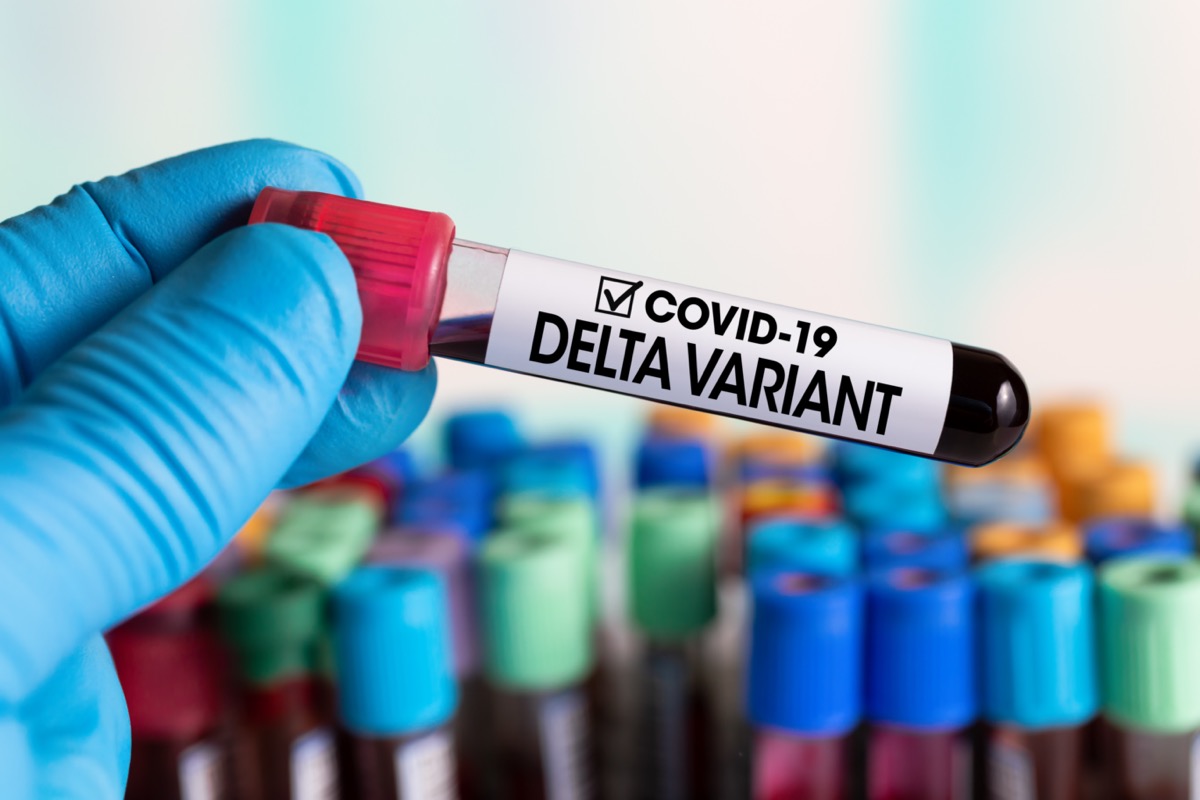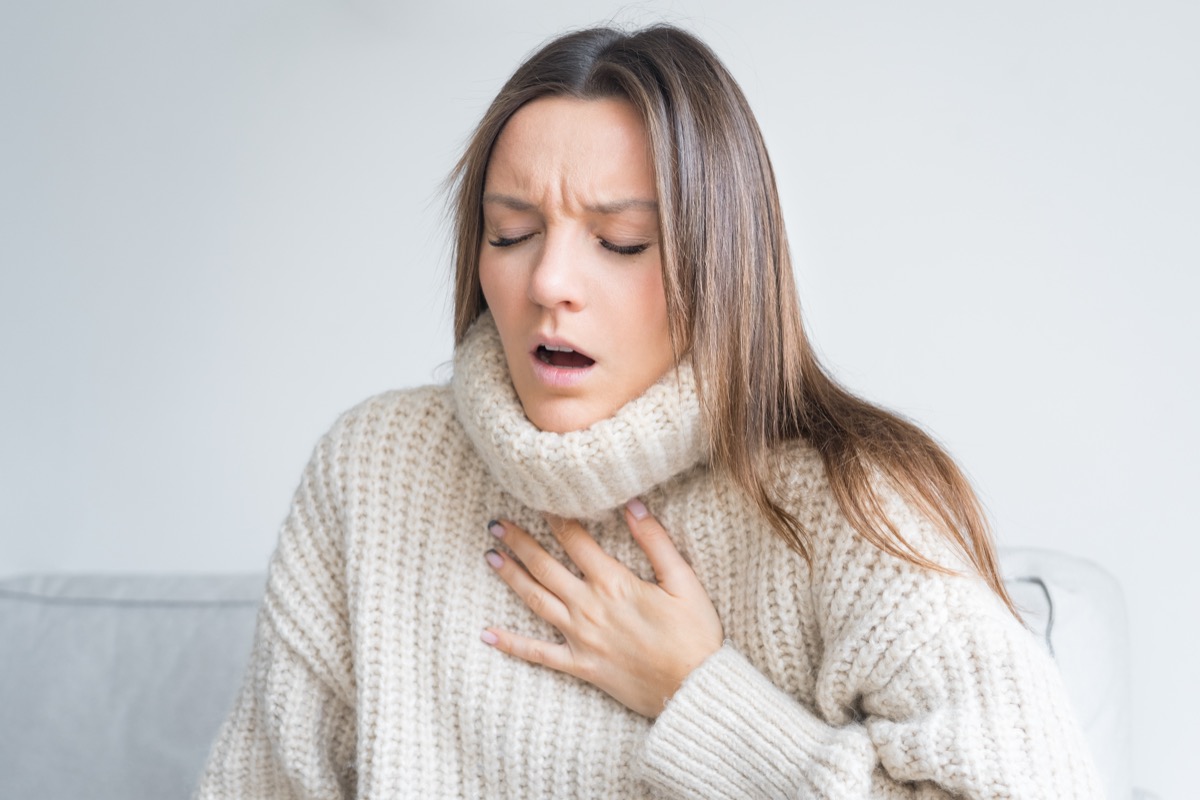Although the world is slowly showing signs of what life was like before COVID-19, the pandemic isn’t over. The U.S. death toll recently reached 700,00 according to AP News, and the rapid spread of the Delta variant is still worrisome for many medical experts. The CDC states the Delta variant is “highly contagious, more than 2x as contagious as previous variants,” so how do you know if you have it? Read the 6 tips below to find out what the Delta variant is and what the symptoms are from specialists who talked to Eat This, Not That! Health—and to ensure your health and the health of others, don’t miss these Sure Signs You’ve Already Had COVID.


The pandemic continues to rage on in part due to the rise of COVID-19 variants like Delta. Dr. Tom Yadegar, pulmonologist and medical director of the intensive care unit at Providence Cedars-Sinai Tarzana Medical Center explains, “The Delta variant has illuminated the ripple effect of a poorly managed public health crisis. More infectious and lethal than the original strain seen in the early days of the pandemic, the Delta variant emerged as a direct consequence of slow vaccination rates. With each opportunity for viral replication comes with the risk for mutations, leading to the rise in stronger variants. Clinically differentiating between variants is nearly impossible except for running genomic testing, which is generally only available through research institutions for the purpose of large-scale epidemiological studies. However, separating Delta from its predecessors is the higher infection rates and increasing hospitalizations and death in young and otherwise healthy patients. Fueled by early scrutiny of COVID-19 as a disease afflicting primarily older patients, the hesitancy to accept widespread accountability caused further delay.”
RELATED: These 8 States are Next COVID “Hotspots,” Says Virus Expert


Early detection of the variant is key and Dr. Suman Radhakrishna MD FACP, Director of Infectious Diseases at Dignity Health California Hospital Medical Center, says, “When an infected patient asks me ‘Do I have delta variant,’ my answer is ‘Yes, most likely since this is the most common variant circulating in the community today.’ Tests for COVID that are commercially used do not distinguish between variants. The health department collects samples of positive tests to check for prevalence of variants. Symptoms are the same with fever, generalized aches and pains and fatigue. However, delta variant infected individuals are more likely to have sore throat, cough, nausea/vomiting and diarrhea. Symptoms with the Delta variant are also more likely to develop sooner after exposure, as early as two days.”
RELATED: Dr. Fauci Just Issued This Warning About Future Mutations


While there are similarities with the COVID-19 and the Delta variant, Dr. Radhakrishna explains the differences.”The symptoms are similar, but with Delta, patients are experiencing GI issues and a sore throat that isn’t common with Covid. Delta is more infecting people much younger and it’s causing more deaths. The people being hospitalized are younger, not the grandparents because they got vaccinated. A large portion of the patients coming through are between 20 and 60.” She adds, “when the pandemic first started there was a shortage of the vaccine so people who were at risk like first responders, health care providers and people over 65, received the vaccine first. Then the general population was able to get vaccinated and now everyone can. There’s no wait.”
RELATED: Forgetting This One Thing Can Mean You Have Alzheimer’s


We mostly hear about the Delta variant in the news, but there are others as well. Dr. Yadegar says, “Symptomatically, there is no difference between the Delta variant and other variants. There continues to remain a broad spectrum of symptoms observed that are unique to each individual, which is significantly worse in unvaccinated patients. Early within the infection course, patients report of symptoms representing a typical infection: fever, weakness, cough, diarrhea or nausea. Unlike other respiratory infections, SARS-CoV-2 can induce an autoimmune reaction in a subset of patients. Observed in the second week after first symptom onset, the virus can send a patient’s immune system into overdrive, leading to destruction of otherwise healthy organs. Aptly named “Cytokine Storm”, a tsunami-equivalent of inflammatory cells bombard healthy tissues, leading to further deterioration, hospitalization and death if not diagnosed early and treated early and aggressively. Symptoms of a possible Cytokine Storm are shortness of breath and lower than normal blood oxygen saturations that typically occur 7-14 days after a patient first exhibited symptoms.”
RELATED: Health Habits You Should Avoid if Over 50


We all have pandemic fatigue and want this to be over. In order for that to happen Dr. Yadegar says, “There is a two-prong approach to ending the pandemic: treating patients effectively and keeping vaccination rates high. The key to effective treatment is to treat patients early and systematically. Currently, there is no standardized approach to treating COVID-19 infections, as many COVID-19 positive patients receive varying treatments at the discretion of their physician– primarily without significant justification. To date, the sole approved medication for treatment of non-hospitalized COVID-19 patients, monoclonal antibody infusion, continues to remain under-utilized across the country. Combined with continued monitoring for any adverse events, patients can significantly improve their likelihood for avoiding hospitalization and death. And if patients remain pro-active in advocating for their health by monitoring themselves and receiving their vaccinations and boosters when eligible, we can take our collective step forward towards living without fear of COVID-19.
RELATED: If You Got Pfizer, Here’s Your Booster Info


Dr. Radhakrishna, who regularly treats patients with COVID and the Delta variant says, “Vaccinated individuals who are infected with COVID are often asymptomatic and recognize infection when they are tested (for international travel, participate in group activities). Most symptomatic individuals are unvaccinated. Those who receive one dose of the mRNA vaccines are not adequately protected and can get symptomatic COVID. I have treated very few vaccinated individuals with severe COVID. All these patients were immunocompromised and were not adequately protected by the vaccine.”
She adds, “Everybody got their kids vaccinated until smallpox was a nonentity. Until COVID becomes a nonentity, this is something we need to do to save ourselves and friends and family. We’re not going to push this vaccine after COVID is gone. We just need it now. It may not be 100% for the Delta variant, but it still prevents death. A third dose in the immunocompromised individuals will help those with suboptimal immune response. The booster helps augment the response and counteracts waning immunity. The protective effects of the COVID vaccine far outweighs any possible side effect from vaccination in the midst of this pandemic.” Go get vaccinated, and to protect your life and the lives of others, don’t visit any of these 35 Places You’re Most Likely to Catch COVID.